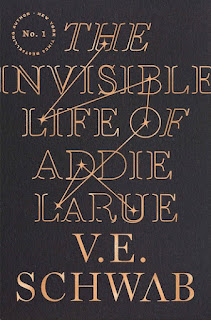The author warns us in a prefatory note which she attributes to Estele Magritte, 1642-1719:
The old gods may be great, but they are neither kind nor merciful. They are fickle , unsteady as moonlight on water, or shadows in a storm. If you insist on calling them, take heed: be careful what you ask for, be willing to pay the price. And no matter how desperate or dire, never pray to the gods that answer after dark.
I am not a big fan of fantastical literature, but this novel raises so many fascinating philosophical questions about personal identity and its link to memory that I continued to ponder the questions long after I had finished reading the story, a story which stands on its own even without the philosophical meandering, but which is so much better as a book because of the reflections on personal identity.
Adeline is a girl who lived at the cusp between 1698 and the eighteenth century. Much loved by her father, a woodworker, he always takes her with him when he takes his wares to market. “Adeline is seven, the same as the number of freckles on her face. She is bright and small and quick as a sparrow.” She continues to leave her small village three times a year to go to the city of Le Mans, but when she turns twelve, her parents decide she should no longer be allowed to go to the large town, that it is unseemly for a young girl to wander the market.
“You are not a child anymore.”
And Adeline understands and still does not understand at all—feels as if she’s being punished for simply growing up.
And then she is sixteen and, against her will, betrothed to a man more than twice her age.
I do not want to marry.
“I do not want to belong to someone else,” she says with sudden vehemence. The words are a door flung wide, and now the rest pour out of her. “ I do not want to belong to anyone but myself. I want to be free. Free to live, and to find my own way, to love, or to be alone, but at least it is my choice, and I am so tired of having no choices, so scared of the years rushing by beneath my feet. I do not want to die as I’ve lived, which is no life at all.
This she tells to a shadow, a handsome man with dark curls and green eyes, a man she comes to call Luc.
The novel jumps from France in 1714 to New York City in 2014. Addie’s wish has been granted and she has lived for over three hundred years. The curse for her freedom and apparent immortality is that no one remembers her. She is forgotten simply by turning her back or walking away. If she takes a man to her bed, she knows he will awaken in the morning startled by the stranger in bed with him. Although she can get money, usually by stealing, landlords will not rent to a lone woman. It is only when she begins to wear trousers and a buttoned coat, a hat that is pulled down over her face that she can roam freely.
The darkness claimed he’d given her freedom, but really, there is no such thing as freedom for a woman, not in a world where they are bound up inside their clothes, and sealed inside their homes, a world where only men are given leave to roam.
I will return to the story in a moment, but let us first ask about the connection between memory and personhood. Oliver Sacks describes a man who has no short-term memory at all, but only a hazy recall of a distant past. If philosophers are right, memory is a necessary condition of personal identity, of being the same person over time. Sacks tells of tricking a client (he does not like the word “patient”) into looking into a mirror and seeing not the person he thinks himself to be, but a much older man. He is horrified and confused, and Sacks chides himself for such a cruel trick.
I agree with Sacks and others that memory is crucial to personal identity. But what of Schwab’s clever trick of asking whether a person not remembered is really a person. Will they feel as Addie does, that she is really invisible because unknown.
Eventually, Addie wanders into a bookstore, The Last Word, and steals a copy of The Odyssey, in Greek no less. She knows that even if the clerk sees her theft, by the time he confronts her on the street, he will have forgotten who she is and what he is doing with her. Imagine the shocked surprise when she returns to the shop a few days later asking to exchange to book for an English copy, and the clerk says, “I remember you” and scolds her for her impudence in trying now to exchange the stolen book for another. But all Addie can hear are his words, “ I remember you.”
Finally she is known, remembered, but how can this be so, how can the clerk, Henry, remember her in spite of the curse? To discover the answer to that question as well as the fates of Adeline and Henry, you will have to read the book.
While this novel will more than stretch your ability to suspend disbelief, I think it will also enchant you and lead you to ask questions about your own identity and what it depends on.


No comments:
Post a Comment